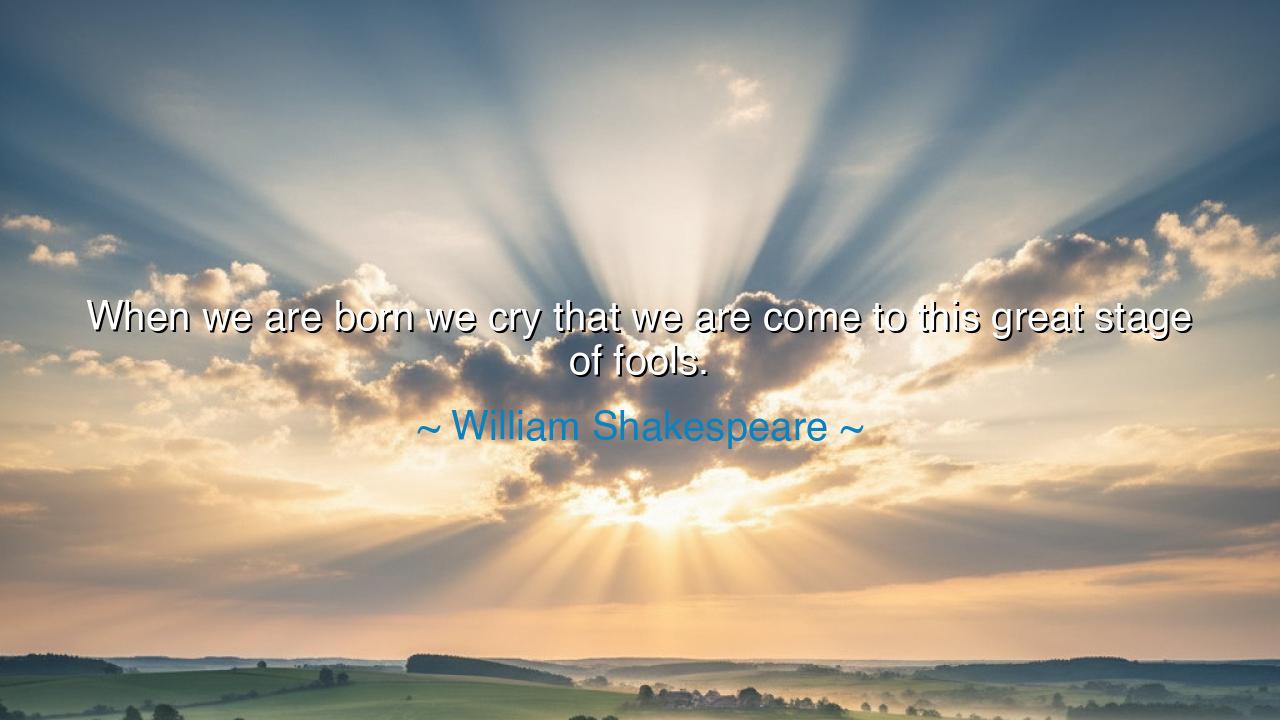
When we are born we cry that we are come to this great stage of






“When we are born we cry that we are come to this great stage of fools.” Thus spoke William Shakespeare, the poet who saw the soul of humankind more clearly than any before or since. The line comes from King Lear, that mighty tragedy of pride, madness, and awakening — a play that stands like a mountain in the landscape of human art. In these words, Shakespeare gives voice to the weary wisdom of an old king who has looked upon the world and found it both magnificent and absurd. The phrase, though simple, carries the weight of eternity. It is not merely the complaint of a disillusioned monarch — it is the lament of humanity itself, born into a world where folly reigns as master, and where wisdom must learn to walk among the fools without despair.
When King Lear utters these words, he has been stripped of his kingdom, betrayed by his daughters, and cast out into the wilderness. The storm rages around him, yet the greater storm is within — the tempest of a man who has at last seen truth. He recognizes that life itself is a stage, where men and women play their roles — often foolishly, often blindly — until the curtain falls. In calling it “a great stage of fools,” Shakespeare does not mock existence, but reveals its tragic comedy. We are born crying, he says, because instinctively we sense the turmoil we are entering — a world of vanity and error, where men chase shadows and call them substance, where pride masquerades as power, and ignorance struts as wisdom.
The ancients, too, spoke of this truth. The philosophers of Greece and Rome knew that humanity is a creature both divine and ridiculous — capable of the highest virtue and the deepest folly. Socrates, who was called the wisest of men, declared that his wisdom consisted in knowing how little he knew. The Stoics taught that life is a theater, and that each man must play his part with dignity, no matter how humble or absurd it seems. Shakespeare, drawing from this ancient well of wisdom, wove their insight into poetry that transcends philosophy. He shows us that the laughter and tears of life are intertwined, that every act of greatness carries a shadow of foolishness, and that perhaps the gods themselves smile upon our struggles with both pity and affection.
Consider the story of King Lear himself — a man whose folly was born of pride. He divided his kingdom not according to justice or wisdom, but according to flattery. He sought love in words, not in deeds, and was deceived. Yet through his suffering, through the stripping away of all that made him mighty, he gained what he had never possessed: understanding. He saw that he, like all men, had been both ruler and fool, master and slave to his own illusions. His cry about “this great stage of fools” is not one of bitterness, but of revelation. For in recognizing the madness of mankind, he finally perceives the truth of compassion. He learns to forgive others because he sees in them the same blindness that once ruled himself.
History offers many such mirrors. Consider Napoleon, that titan who conquered continents, only to be undone by his own ambition. He was hailed as a genius in his ascent and mocked as a fool in his downfall. His story, like Lear’s, shows how greatness and folly often walk hand in hand — how the same fire that drives a man to triumph can also consume him. In the grand theater of history, kings, conquerors, and commoners alike perform their parts, thinking themselves wise, while destiny — silent and unchanging — looks on. Shakespeare, with a poet’s vision, saw that we are all actors in this drama, each convinced of our importance, yet each destined to vanish when our scene is done.
And yet, my friend, there is a deeper wisdom in these words, a lesson for those who would live well amid the folly of the world. Shakespeare does not tell us to despair of life, nor to withdraw from it in scorn. Instead, he invites us to see clearly — to laugh at our own vanities, to forgive the errors of others, and to walk through this “stage of fools” with grace and humility. For though the world is foolish, it is also beautiful. Its madness is part of its mystery, and those who understand this find peace not in perfection, but in acceptance. The wise man does not flee the theater; he plays his part well, knowing that all are flawed and that the play itself has meaning beyond his understanding.
So, let this be your lesson: when you see the folly of others, do not grow bitter; when you see your own, do not despair. Remember that life is a stage, and that wisdom lies not in refusing to act, but in acting with awareness. Do the small things with sincerity, the great things with humility, and accept both laughter and tears as part of the same divine comedy. Know that every man who walks the earth is both fool and philosopher, both actor and audience in the drama of being.
For as William Shakespeare teaches through the voice of Lear, we are born crying because we awaken in a world of folly — but it is through that folly that we learn compassion, through error that we find truth, and through suffering that we approach wisdom. The world may be a stage of fools, but those who recognize their own foolishness have already taken the first step toward becoming wise.






AAdministratorAdministrator
Welcome, honored guests. Please leave a comment, we will respond soon